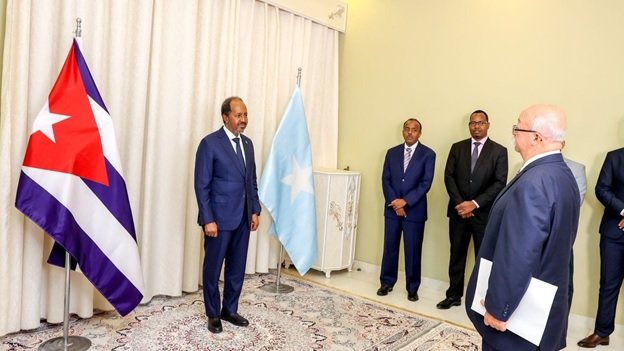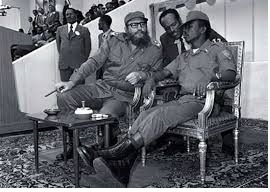By Abdirahman Dhuxul
After a 46-year lapse in diplomatic relations, the Cuban-appointed Ambassador to Somalia presented his credentials to Hassan Sheikh Mohamud, the president of Somalia. The reestablishment of diplomatic ties between the two countries marks a significant turning point in their respective histories.

In a tweet on Monday, Abshir Omar Jama, Somalia’s Foreign Minister, said that diplomatic ties between his country and the Republic of Cuba had been restored. He expressed his delight at reestablishing relations, noting that the two nations had previously held diplomatic relations between 1972 and 1977.
He emphasized that the renewed relationship would be based on cooperation and mutual respect.
The Ideology of Greater Somalia and Cuba’s Role in the Region
In 1960, Somalia gained its independence, and the idea of a Greater Somalia became a shared dream among the Somali people. The concept of Greater Somalia is a nationalist ideology that advocates for the union of all ethnic Somalis.
President Abdirashid Ali Sharmarke was killed in 1969, which led to a coup d’état that overthrew the Somali Republic. General Mohamed Siad Barre took over as president of Somalia. Like many Somalis, Barre dreamed of a unified Greater Somalia that included Djibouti, Ethiopia’s Somalia region, and Kenya’s Northern Frontier district.

The Derg, a group of Marxists and Leninists in the Ethiopian military, staged a military coup in September 1974. This coup resulted in the overthrow of Haile Selassie and his government. The Derg received support from the Soviet Union and Cuba.
On July 18, 1975, diplomatic ties were established between Cuba and Ethiopia. This was not long after the Derg took power, got rid of the monarchy, and adopted communism as an ideology. The Ethiopian Provisional Military Government and Cuba forged a strong political bond soon after. As a result, in August 1976, both nations inaugurated permanent embassies within their respective territories.
Barre saw that Ethiopia’s new government wasn’t very strong, so he decided to take over the Somalia region in Ethiopia. However, Castro and the Soviet Union had a different view; they wanted to strengthen their alliances with Somalia, Ethiopia, and south Yemen to control the Suez Canal, the Arabian Gulf, and the Indian Ocean. Castro’s mediation between Somalia and Ethiopia in Aden ended without progress.
According to the Wilson Digital Center Archive, a transcript of a meeting between East German leader Erich Honecker and Cuban leader Fidel Castro in East Berlin shows what Castro thought about a trip he took to Somalia. Castro reportedly described Siad Barre, the leader of Somalia, as “very arrogant and severe.
Castro criticized Barre’s leadership style: “I have made up my mind about Siad Barre; he is, above all, a chauvinist. Chauvinism is the most important factor in him. Socialism is just an outer shell that is supposed to make him more attractive.” Castro added that Barre’s socialist doctrine was only for the masses and that the party was there to support his personal power. This excerpt provides insight into Castro’s observations of Somalia and his thoughts on Barre’s leadership.
During the 1977–1978 Somali–Ethiopian War, Cuba supported Ethiopia by sending troops, military advisers, and equipment to assist in the conflict. Fidel Castro, the leader of Cuba at the time, sent over 11,000 Cuban troops and more than 6,000 advisers to Ethiopia to fight alongside Ethiopian forces against the Somalis.
The End of an Era: Somalia Decided to Break Up its Ties with Cuba
In November 1977, Somalia opted to sever its relations with Cuba and terminate a friendship and cooperation agreement with the Soviet Union, which had been entered into three years earlier. The Somalis leveled accusations against Cuba and the Soviet Union, alleging that they had conspired to launch a combined assault on the nation, emanating from Ethiopia, Somalia’s neighbor. This assistance from Cuba was crucial to Ethiopia’s victory in the war, as it helped to turn the tide of the conflict in their favor.
Somali elites have differing opinions regarding Siad Barre’s decision to go to war with Ethiopia in 1977-78. Some accuse Barre of not properly considering the possible outcome of the war before initiating it, failing the Somali military and causing significant losses for the country. They suggest that Ethiopia had numerous allies who provided assistance, which was crucial to their victory.
On the other hand, some people still support Barre’s decision to go to war, believing that it was the only option available to him at the time. They may argue that Ethiopia’s aggressive behavior towards Somalia left Barre with no option but to respond with force.
The conflict with Ethiopia had a significant impact on Somalia and its people, with consequences still being felt today. The war devastated Somalia’s economy and infrastructure, leading to widespread poverty and instability. In addition, the conflict exacerbated existing tensions between clans and contributed to the breakdown of social cohesion
The 46-Year Gap Between Somalia and Cuba Relations: Understanding the Reason.
In the aftermath of the 1977 Ogaden War between Somalia and Ethiopia, a coup attempt was made in Somalia. The failure of this attempt resulted in the killing of many soldiers and the escape of others from the country. These soldiers were left without a home and started rebellions that eventually led to the downfall of the Somali state in 1991. The country was left in a state of anarchy, and state-building efforts took many years to gain traction.
This tumultuous period in Somali history is one of the factors that contributed to the long-standing gap in relations between Somalia and Cuba. Despite the need for international cooperation and collaboration in times of crisis, the fallout from these events caused Somalia not to have diplomatic ties with Cuba and other nations.
In an interview with VOA, Ahmed Isse Awad, Somalia’s former foreign minister, said that the 46-year gap in diplomatic relations between Somalia and Cuba was caused by the country’s internal war and focus on reconstituting the state. The geographical distance between the two countries also played a role.
Awad emphasized the importance of maintaining positive diplomatic relationships with all countries, stating that if Cuba sent an ambassador to Somalia to improve relations, it would benefit both countries. He further expressed that it is not in Somalia’s interest to dwell on past hostilities and that a country cannot be “self-imprisoned” by its past.”
How both countries could benefit from restoring relations
The partnership between Cuba and Somalia has the potential to be mutually beneficial. Cuba’s medical diplomacy program, which involves sending doctors and healthcare professionals to other countries, has been a crucial aspect of the country’s foreign policy. The program is renowned for its community-based approach and emphasis on preventative care, which has enabled Cuba to achieve some of the world’s best health indicators. Additionally, Cuba has accomplished universal access to free education, with a youth literacy rate of 100 percent, according to UNICEF. The country’s education system is based on a philosophy of social justice and equality, which emphasizes the importance of providing education to all, regardless of socioeconomic status.
Somalia, on the other hand, has long struggled with poverty, conflict, and limited access to education and healthcare. By partnering with Cuba, Somalia could benefit from its medical diplomacy and education policies. Furthermore, Somalia’s strategic location in the Horn of Africa could help expand Cuba’s presence in the region. Despite potential challenges, this collaboration has the potential to bring about positive change for both countries.
Abdirahman Dhuxul
Email: [email protected]
We welcome the submission of all articles for possible publication on WardheerNews.com. WardheerNews will only consider articles sent exclusively. Please email your article today . Opinions expressed in this article are those of the author and do not necessarily reflect the views of WardheerNews.
WardheerNew’s tolerance platform is engaging with diversity of opinion, political ideology and self-expression. Tolerance is a necessary ingredient for creativity and civility.Tolerance fuels tenacity and audacity.
WardheerNews waxay tixgelin gaara siinaysaa maqaaladaha sida gaarka ah loogu soo diro ee aan lagu daabicin goobo kale. Maqaalkani wuxuu ka turjumayaa aragtida Qoraaga loomana fasiran karo tan WardheerNews.
Copyright © 2024 WardheerNews, All rights reserved


